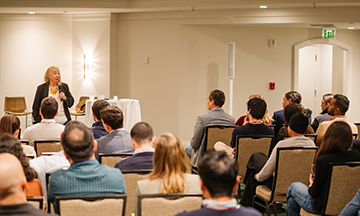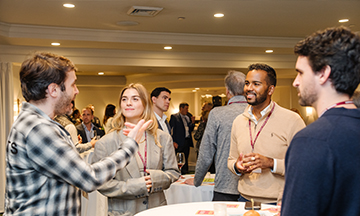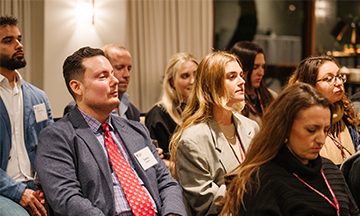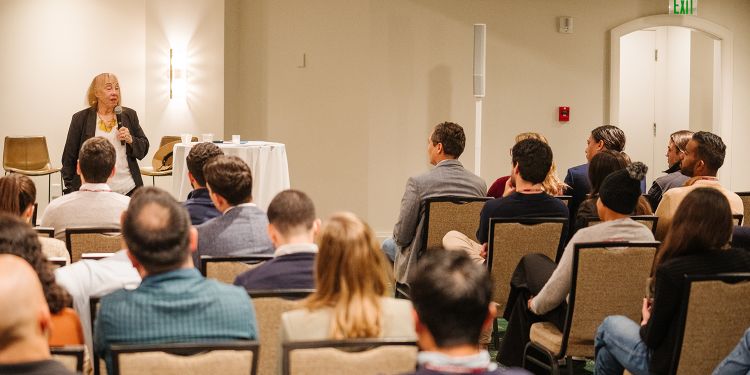Are you interested in connecting with other alumni leveraging their careers to confront climate change? BEI invites HBS Alumni to join our Alumni in Climate Networking Series for a chance to connect with local alumni to discuss ideas, trends, opportunities, and challenges at the intersection of business and the environment. Email bei@hbs.edu to learn more about upcoming events.
On January 23rd, 2025, the Business and Environment Initiative (BEI) and HBS Alumni Relations cohosted a gathering of alumni interested in learning more about how to confront climate challenges. This event brought together over 90 HBS and Harvard alumni, alongside participants from Harvard's Advanced Leadership Initiative and Young American Leaders programs.
The evening was highlighted by an engaging presentation from Professor Rosabeth Moss Kanter, who shared compelling climate innovation stories from four recent case studies. Her insights illuminated how passionate believers are driving meaningful change across various sectors.

Harnessing Ocean Energy: Vineyard Wind
Professor Kanter began with the groundbreaking Vineyard Wind project, which features 80 wind turbines off the coast of Massachusetts. This ambitious offshore wind farm exemplifies how large-scale renewable energy infrastructure projects need to have actively supportive stakeholders throughout the process. Vineyard Wind won over community stakeholders initially which allowed them to start installing the turbines, the overall support for the project however was weak. So down the line when a turbine broke and debris flushed on to Nantucket beaches, the town sued them - and there was no groundswell of enthusiastic defenders and advocates for the turbine project. Professor Kanter stressed the takeaway lesson is that leaders must not be content to just neutralize opposition, they must turn passive stakeholders into active fans - especially when the venture is an innovation not yet familiar to the public.
Transforming Transportation: Highland Electric Fleets
The discussion continued with Highland Electric Fleets, which is revolutionizing school bus systems across the country. By converting regularly scheduled school buses to electric vehicles, Highland has created a dual-purpose solution – these buses not only transport children safely but also return to depots where they serve as valuable battery storage units. Professor Kanter highlighted how this model builds natural constituencies of support by addressing the health impacts of diesel exhaust on children who often stand near bus tailpipes. Highland's innovative financing model makes the transition financially appealing to school districts, while carefully chosen demonstration projects continue to build demand for this sustainable transportation solution.

Cooling Innovation: Blue Frontier's Air Conditioning Revolution
The event also featured the groundbreaking work of Daniel Betts, founder of Blue Frontier, who was in attendance. His company is tackling what Professor Kanter termed "the air conditioning paradox" – the cycle where cooling systems that combat rising temperatures simultaneously contribute to climate change through their energy consumption. Blue Frontier's innovative technology for commercial buildings not only provides efficient cooling but also functions as a storage battery, demonstrating the potential for dual-purpose climate solutions. By strategically implementing their technology in high-visibility locations, Blue Frontier is building awareness and demand for sustainable cooling alternatives.
Entertainment as a Climate Catalyst: Climate Pledge Arena
The final case study presented was Seattle's Climate Pledge Arena, a powerful example of how sports and entertainment venues can lead in sustainability. Originally built for the 1962 Seattle World's Fair, this renovated facility has been transformed into a zero-carbon venue. Memorably opened by Coldplay, the arena incorporates numerous sustainable features and even includes public transportation in the ticket price – eliminating a significant source of emissions associated with large events while creating a seamless experience for attendees. Professor Kanter emphasized how such venues are effectively "making fans" not just of sports teams, but of climate-conscious practices.

Beyond the formal presentations, the event created valuable opportunities for alumni to connect, share insights, and explore potential collaborations. The diverse attendance – spanning different Harvard programs and generations of graduates – created a rich environment for cross-pollination of ideas. As the evening concluded, participants left with renewed inspiration and strengthened connections, ready to apply insights from Professor Kanter's case studies to their own climate initiatives.

